During the half-century before the Second World War — and before the arrival of the Displaced Persons — Latvian immigrants and their descendants in the United States published at least four dozen periodicals, including newspapers and journals. Almost every ideological and religious group produced at least one publication, be it Lutheran, Baptist, nationalist, socialist, communist or anarchist. Collections of these publications, usually with notable gaps, may be found in a few public and university libraries and archives in places such as New York, Boston, Minneapolis and Stanford, as well as in Rīga, Latvia. Images here are from my personal collection, which unfortunately does not include every publication.
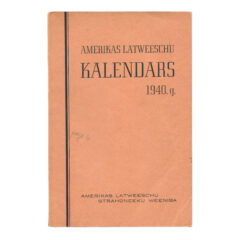
Boston, 1940-1945
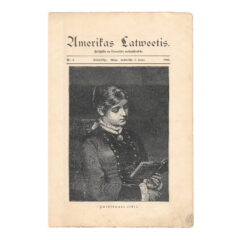
Philadelphia, 1901-1905
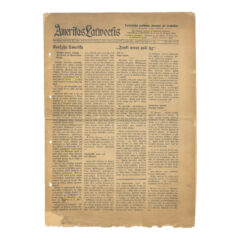
Boston, 1940-1976
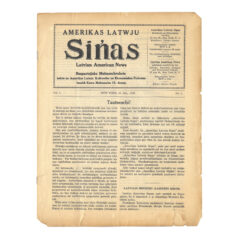
New York, 1926-1927
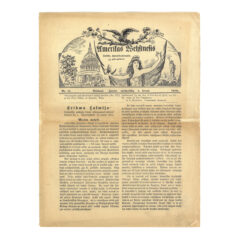
Boston, 1896-1920
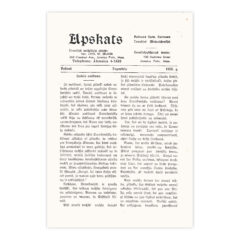
Boston, 1923-1956
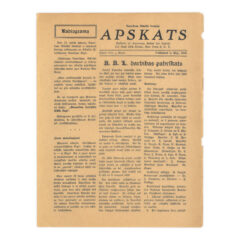
New York, 1945
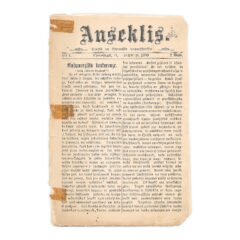
Cleveland, 1898-1901
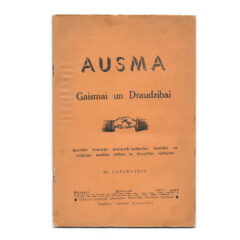
Boston, 1941-1944
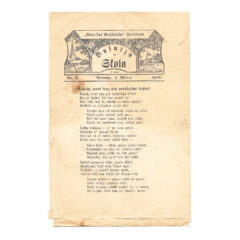
Boston, 1916-1918
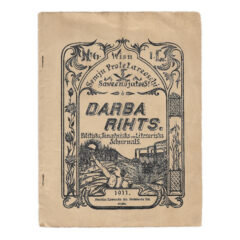
Boston, 1911
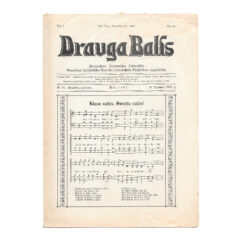
New York, 1917-1920
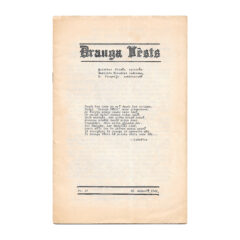
New York, 1942-1947
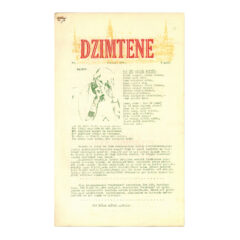
New York, 1940-1941
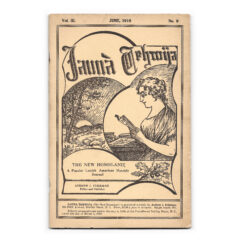
Philadelphia, 1913-1917
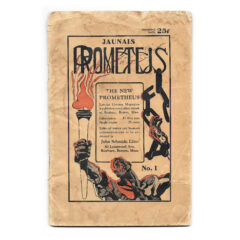
Boston, 1927
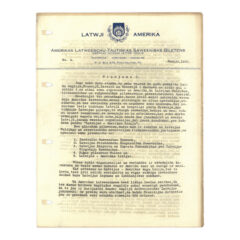
Philadelphia, 1920
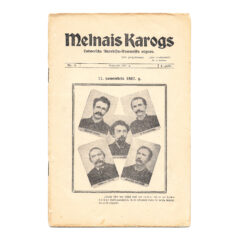
New York and Paris, 1911-1913
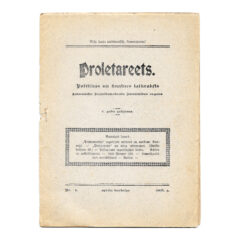
Boston, 1902-1917

San Francisco, 1915-1917

Boston, 1920-1922

Boston, 1906-1919

Boston, 1935-1939

Boston, 1923-1934
Other publications not represented here include:
- Amerikānietis (The American), a socialist semi-monthly newspaper published 1904-1905 in Boston. It had perhaps the most attractive flag of any of the early publications. The publisher sold the assets to Strādnieks, which began in 1906.
- Amerikas Cīņa (The American Struggle), published in Chicago and then Boston from 1926-1934 by the Lettish Bureau of the Workers (Communist) Party of America, later the Lettish Bureau of the Communist Party of the United States of America. In 1934, the paper was merged with Strādnieku Rīts to become Strādnieku Cīņa.
- Amerikas Latviešu Avīzes (The American Latvian News), a liberal newspaper published from 1896-1903 in Boston. It often engaged in polemics with the conservative Amerikas Vēstnesis.
- Amerikas Latviešu Luterāņu Kalendārs (The American Latvian Lutheran Calendar), an annual publication appearing from 1897-1913 in Boston. The publisher was Jēkabs Zībergs, editor of the religious and nationalist newspaper Amerikas Vēstnesis.
- Apskats (The Review), a worker-oriented “social, scientific and literary monthly” published in 1914 in Chicago. Read more about the journal in this overview.
- Atbalss (The Echo), a communist newspaper published in 1918 in New York. It was a replacement for Strādnieks, which had been banned from the mail. However, Atbalss itself was deemed “unmailable” under the Espionage Act.
- Āzis (The Billy-Goat), published in 1909 in Chicago by an unidentified group. It most likely had socialist leanings. Read more about the journal in this overview.
- Baznīcas Vēsts (Church Herald) was the name of the newsletter of the Trinity Latvian Evangelical Lutheran Church of Boston (Bostonas Latviešu evaņģēliski luterāniskā Trīsvienības draudze). The monthly periodical first appeared in 1929. From the mid-1960s to the early 1970s, the newsletter was named Baznīcas Ziņas (Church News). The periodical ceased to be published when the church in 1978 merged with the Mission Latvian Evangelical Lutheran Church of Jamaica Plain (Džamaikapleinas latviešu evaņģēliski luterāniskā Misijas draudzi).
- The Beacon, a Baptist newsletter published from 1929-1934 and then from 1936 to at least 1951. It was edited and published by Roberts K. Petersons in Mount Vernon, New York.
- Biļetens (The Bulletin), a communist newsletter published briefly in 1918 in New York to replace Strādnieks, which had been banned from the U.S. mail. Biļetens was replaced by Atbalss.
- Brīva Tribūna (The Free Tribune), published 1907-1908 in New York by the Socialist Party Lettish League.
- Brīvība (Freedom), an anarchist journal published from 1908-1913 in New York.
- Darba Balss (Voice of Labor), a breakaway socialist journal published 1916-1917 in Boston. Its editors were concerned about the bolshevik elements in the Latvian socialist movement.
- Dieva Sveiksme (God’s Greeting), an eccentric religious publication edted by the Rev. Jānis Steiks. It appeared in 1906 in Boston.
- Draudzības Saite (The Bond of Friendship), appeared during 1940 in New York and was edited by the Rev. Osvalds Blūmītis, a Baptist minister. He had edited a similar publication from 1929-1935 in Latvia.
- Gaisma (The Light), published briefly in 1912 in New York. Edited by Jānis Līdumnieks, it appeared as a replacement for Pērkons.
- Internacionāle (The International) was a leftist publication that appeared in 1909 in New York.
- Jaunais Laiks (The New Times), published in 1920 in New York. Editor was Jānis Līdumnieks.
- Laiks un Mūzība (Time and Eternity) appeared in 1908, probably from Boston. It was edited by Fricis Freidenfelds. The publication likely was directed toward Baptists.
- Latvju Ilgas (The Longing of Latvians), published in 1920 by the Lettish Bureau “Latvia,” a private organization established in New York by promoter Andrejs Saviņš.
- Ļaužu Kancelis (The People’s Pulpit), a religious publication appearing in 1912 in New York.
- Mēneša Apskats (The Monthly Review), published in 1923 by the New York Latvian Education Society, a communist organization.
- Open Forum, a contrarian publication edited by Jānis Līdumnieks and published briefly in 1927 in New York by the New York Lettish Open Forum.
- Patiesības Balss (The Voice of Truth), published 1919-1920, likely in New York by the publishing association Pravda. It claimed to be a “progressive” political and humor publication. It had a largely anti-clerical position.
- Pērkons (The Thunder), a largely satirical journal published 1909-1911 in Philadelphia and then New York. Its editors were Kristaps Rāviņš and Jānis Līdumnieks.
- Rīta Blāzma (The Morning Glow) was a Baptist periodical edited by Kārlis Egle that appeared during the first decade of the 20th century in Philadelphia. However, it is not clear exactly when. One source claims it was published from 1903-1904, another states it appeared briefly after the demise in 1905 of the Baptist Amerikas Latvietis. The periodical also has been referred to as Filadelfijas Cirkulārs (The Philadelphia Circular), although that may be a description, rather than a title.
- Spirituālists (The Spirtualist), probably published in Boston.
- Strādnieka Kalendārs (The Worker’s Calendar), an annual publication by the Latvian Association of the American Socialist Party (Amerikas Sociālistu Partijas Latviešu Koporganizācija), which also produced the newspaper Strādnieks. The calendar was published from 1910-1916 in Massachusetts.
- Zvans (The Bell), a journal of the arts published in 1907 in Philadelphia.

It is likely that others existed, too. Even a few publications that are named here have not been found in any library or archive, but are mentioned in contemporary reports. — Andris Straumanis
The article may be found online at https://straumanis.com/periodika/.
